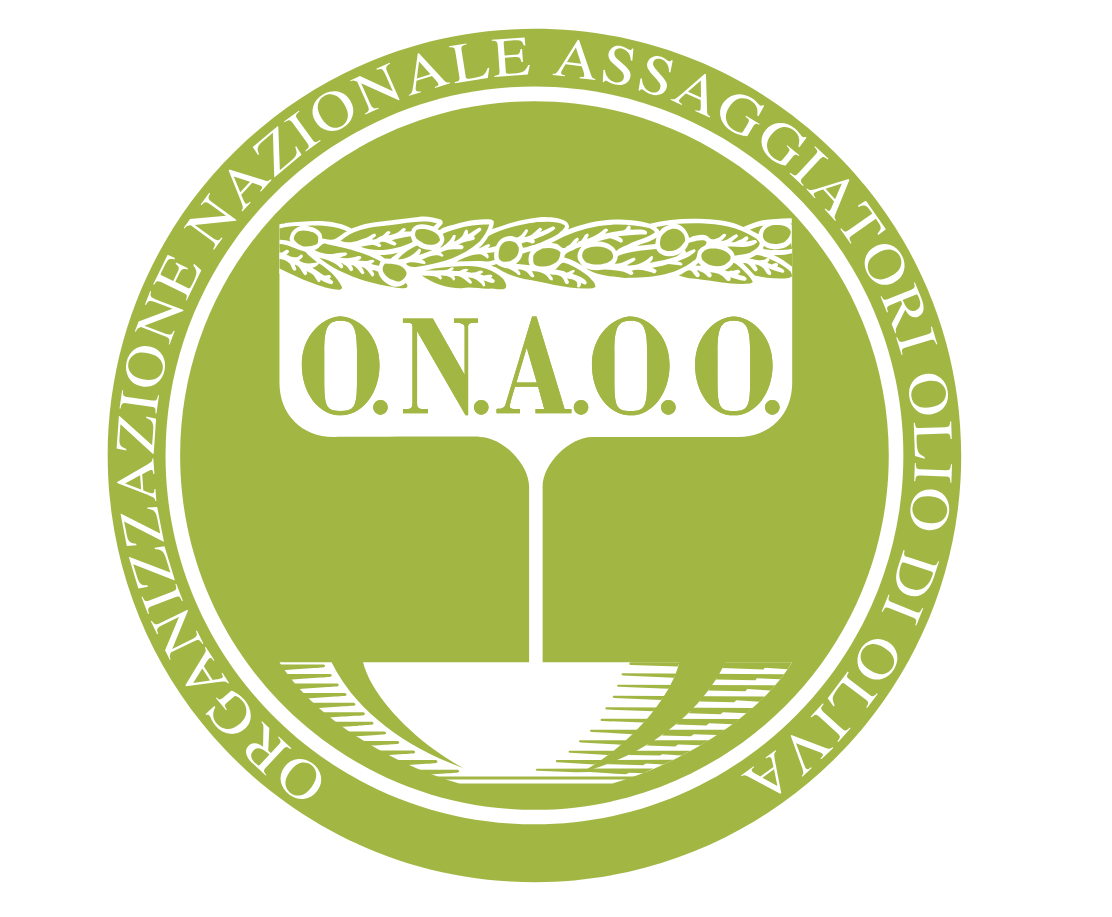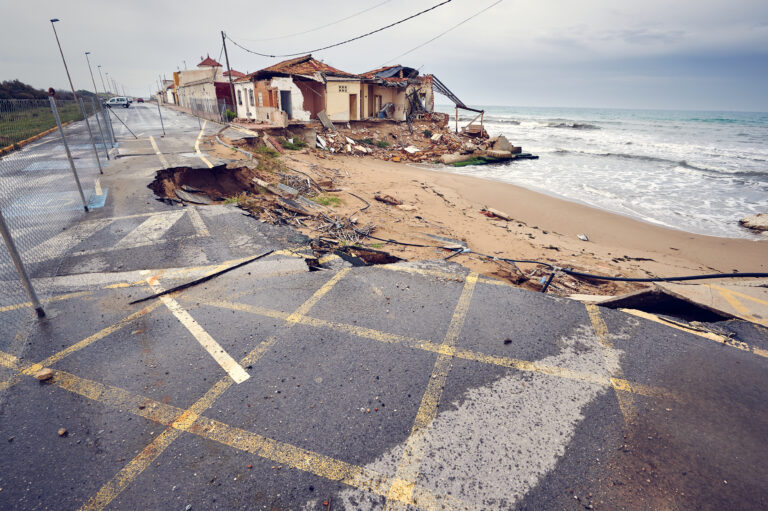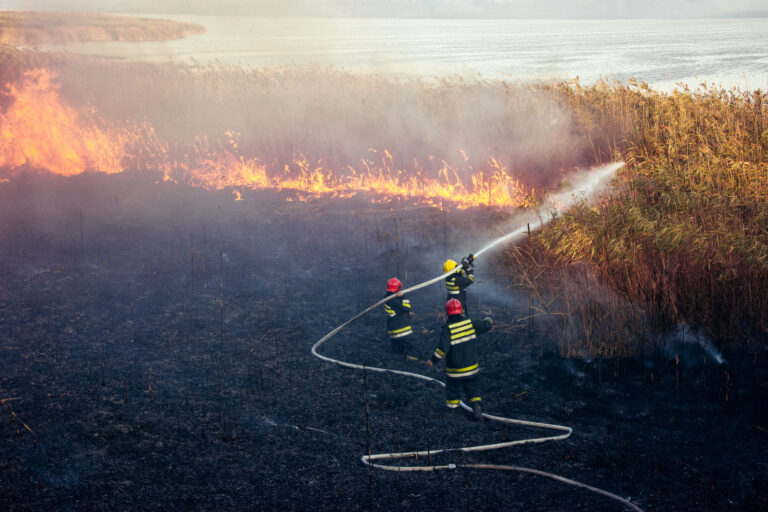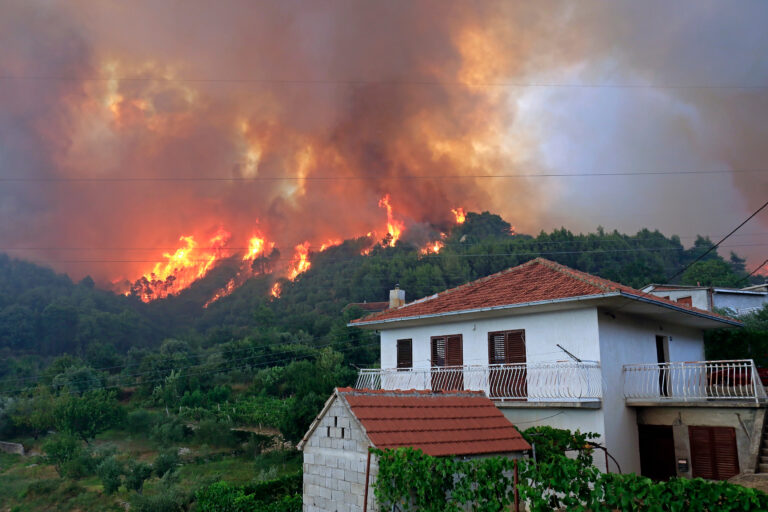The Region of Central Greece is facing several serious climate challenges, including:
Extreme weather events
Climate change is increasing the frequency and intensity of extreme weather events, such as floods, heatwaves, and wildfires. The region is particularly vulnerable to flooding due to its low-lying areas and proximity to rivers and lakes. In recent years, the region has experienced several devastating floods, causing billions of euros in damage and displacing thousands of people. Heatwaves are also becoming a major concern, with temperatures regularly exceeding 40 degrees Celsius in the summer months. This poses a serious risk to public health, especially for the elderly and vulnerable. Wildfires are also a major threat, particularly in the region’s mountainous areas. In recent years, wildfires have destroyed thousands of hectares of forest and farmland.
Water scarcity
Climate change is also reducing the amount of rainfall in the Region of Central Greece, leading to more frequent and severe droughts. However, there has been a significant increase in the number of extreme rainfall events in recent years, due to the fact that climate change is causing the atmosphere to hold more water vapor, which leads to more intense rainfall events. This is a major challenge for the region’s agriculture and tourism sectors. Agriculture is the backbone of the region’s economy, and droughts can have a devastating impact on crop yields. Tourism is also a major industry in the region, and water scarcity can deter visitors from coming.
Sea level rise and coastal erosion
The sea level around the coast of the Region of Central Greece is rising at an average rate of 3.2 millimeters per year. This rate is accelerating and is expected to reach 5 millimeters per year by the end of the century. Sea level rise is already having a significant impact on the coastal communities of the Region of Central Greece. It is causing coastal erosion, flooding, and saltwater intrusion into groundwater supplies. These impacts are expected to become more severe in the future, as sea levels continue to rise.
The trends are disturbing:
- The average temperature in the Region of Central Greece has increased by 1.5 degrees Celsius since the pre-industrial era.
- The average annual rainfall in the region has decreased by 10% since the pre-industrial era.
- The number of heatwaves in the region has doubled since the 1960s.
- The number of wildfires in the region has increased by 50% since the 1990s.
- The cost of damage from extreme weather events in the region has increased by 100% since the 2000s.
These numeric details show that the climate challenges facing the Region of Central Greece are real and significant but also complex and interconnected. This is having a devastating impact on the region’s economy, environment, and well-being. It is important to take urgent action to address these challenges and build a more resilient region to future accidents and disasters.
The Greek government is taking some steps to address climate change in the Region of Central Greece, but more needs to be done. The government is investing in flood defenses, early warning systems, and drought-resistant crops. It is also supporting the development of renewable energy sources and promoting energy efficiency measures. The Region of Central Greece implements the strategy “Smart Region”, supported by the services of the regional government, initiatives, and citizens, to introduce innovative ideas and practices in governance, transparency, economy, social solidarity, environment, culture and to give citizens a platform for participation. In addition to government and regional action, it is also important for individuals and businesses to take steps to reduce their impact on the environment. This could include reducing energy consumption, switching to renewable energy sources, and recycling and composting. The aim of the Regional administration of Central Greece is to build a more resilient and sustainable Region of Central Greece, by working together with all the stakeholders towards this goal.
Pilot projects from other relevant EU projects in the region
ClimateFarmDemo- https://climatefarmdemo.eu/cfd/en/#/farms
CASE STUDIES – https://lessonsonfire.firelogue.eu/case-studies/
WeADAPT – https://weadapt.org/placemarks/maps/
CLIMAAX https://www.climaax.eu/project/
CLIMAAX builds upon existing risk assessment frameworks, methods and tools, and promotes the use of datasets and service platforms for local and regional scale deployment. It will develop a robust and coordinated framework of consistent, harmonised and comparable risk assessments.
ACCEPT – Assessment of Climate Change Effects on Pollution Transport https://accept.cyi.ac.cy/
AQ-SERVE https://aqserve-project.com/
AVENGERS – Attributing and Verifying European and National Greenhouse Gas and Aerosol Emissions and Reconciliation with Statistical Bottom-up Estimates https://avengers-project.eu/
CELSIUS – Projecting Temperature Climate Extremes at Regional to Urban Scales https://celsius.cyi.ac.cy/
CoCO2 – Prototype system for a Copernicus CO2 service https://coco2-project.eu/concept
Edu4Climate – European Higher Education Institutions Network for Climate and Atmospheric Sciences https://edu4climate.cyi.ac.cy/
OptimESM – Optimal High-Resolution Earth System Models for Exploring Future Climate Changes https://optimesm-he.eu/
PREVENT – Improved Predictability of Extremes over the Mediterranean from Seasonal to Decadal Timescales https://cordis.europa.eu/project/id/101081276
LIFE – MEDEA – Mitigating the Health Effects of Desert Dust Storms Using Exposure Reduction Approaches (https://www.life-medea.eu/)
CiROCCO – Enhancing the In-situ Environmental Observations across Under-sampled Deserts https://cirocco-project.eu/
Silvanus Project – https://silvanus-project.eu/
Best practices in the production of olive oil:

Olive Oil Seminars
Olive Oil Seminars – Oliveoil seminars for consumers and oil producers, from Vasilios Frantzolas started in 2005, offering seminars about

O.N.A.O.O.
O.N.A.O.O. – National Organization of Olive Oil Tasters – National Organization of Olive Oil Tasters (onaoo.com) is the first School



